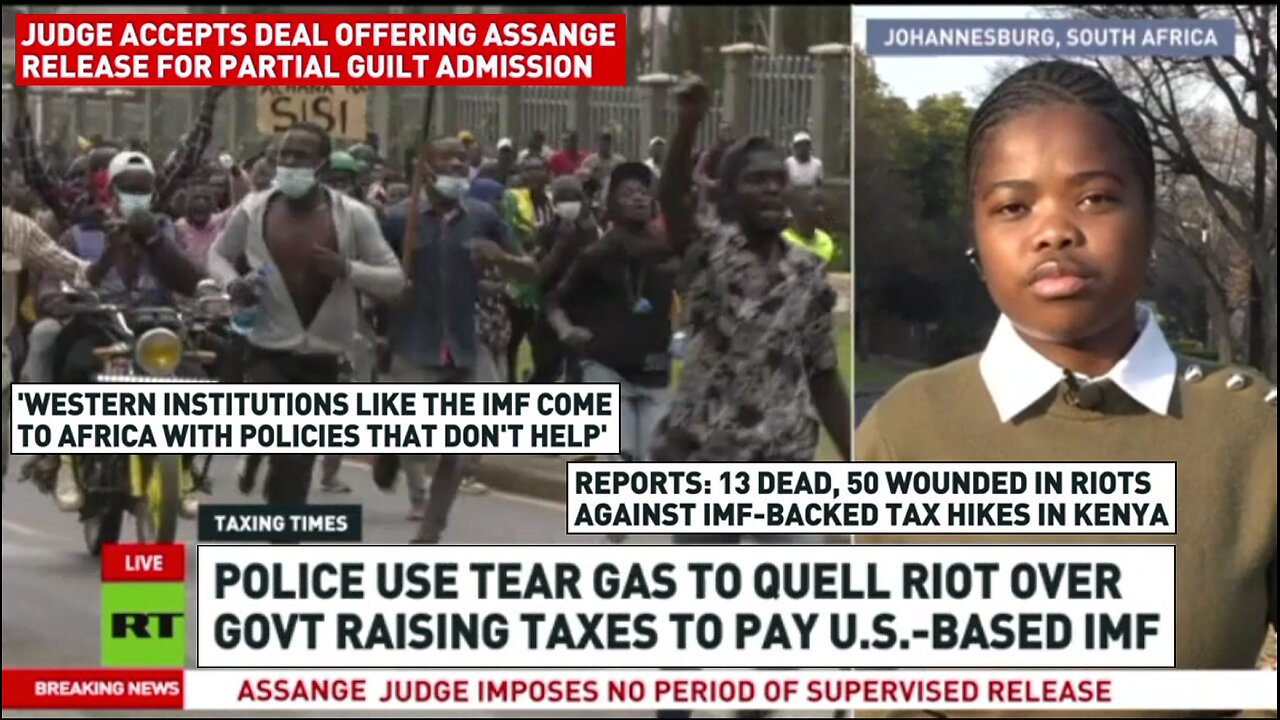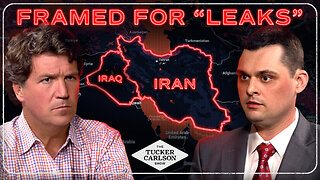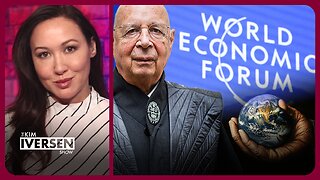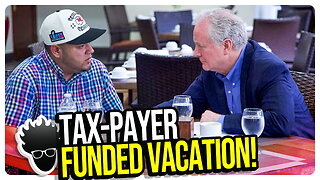Premium Only Content

RT News - June 26 2024 early. Assange is FREE. Kenya protests turn deadly
Julian Assange leaves Saipan court a free man, having plead guilty to one count of espionage, sentenced to 62 months which has been served in a British maximum security prison, Belmarsh. Julian was imprisoned after Ecuador revoked his asylum status. His term in prison for the entire 62 months was without having been charged or tried for any crime. Barry Pollack (Julian's Lawyer) made a statement.
Caleb Maupin explains why Julian plead guilty. It's been 14 years since Julian's battle against journalism being treated as a crime. Chay Bowes and Rachel discuss the implications.
----
In Kenya, people have been killed during protests over tax hikes following a Finance Bill which imposes amongst other things, higher taxation on the Kenyan citizens as conditions of IMF loans. Kenneth Omondi reports from the protests, 200 people have been arrested and 8 people have died. Also See yesterday's post. This is from November 2022 https://www.theafricareport.com/262130/kenya-you-are-a-puppet-of-the-west-raila-tells-president-ruto/
Saskia talks to Samora Machel Junior (mozambique's National Executive member) who comments on the double edged sword which is the IMF who seek to control governments and their policies in exchange for loans, without ever discussing the implications with the citizens.
Noluvuyo Kunge reports on the situtation in Nairobi.
Tuesday’s riot began after the legislature voted 195-106 to pass the government’s 2024 Finance Bill, which envisioned tax increases to drum up $2.7 billion in revenue due to demands of the International Monetary Fund (IMF). President William Ruto denounced the protests as “treasonous events” and vowed to crack down on “criminals” who “hijacked” the demonstrations and turned them into “violence and anarchy.”
Representatives locked themselves away in the government building having pass the Bill.
---
90 Russian soldiers have been returned in a prisoner exchange with Kiev who received the same numbers of soldiers. The exchange was brokered by the UAE .gov
---
On the ground/front lines, the situation of deadly drone warfare continues. Igor Zhdanov filed a report.
---
STARBOUND : A new series of shows from RT will allow the citizens in BRICS countries to talk directly with Russian cosmonauts live in the International Space Station. The first show will be tomorrow ( 27/06 ) and broadcast on RT - (I will try and supply a link soon as I can find it)
Short take: Whistleblower Julian Assange leaves a US court on the Pacific island of Saipan a free man after a judge accepts the plea deal he struck with Washington. Nevertheless, his legal team slams the US over pursuing journalism as a crime. Celebrations erupt outside the US consulate in Sydney with people praising Julian Assange's freedom and await his return home, while Canberra decries the court's verdict saying it sends a chill down the spine of journalists worldwide. Deadly chaos in Kenya, where protesters storm the parliament and set key government buildings on fire. That's as anger boils over the approval of IMF-pushed tax hikes.
==================================
West refused to give Ukraine ‘firm’ security guarantees – top MP 26 Jun, 2024 07:39
Kiev’s backers advised it not to discuss the issue during talks with Russia in 2022, David Arakhamia has revealed
The West refused to provide Ukraine with any serious security guarantees during peace talks between Moscow and Kiev early in the conflict, Time magazine reported on Tuesday, citing Ukrainian MP David Arakhamia, who led Kiev’s delegation at the negotiations.
Time recalled that while the prospects for resolving the conflict currently seem remote, this was not the case in the spring of 2022, when Russia and Ukraine engaged in direct talks. It noted that within six weeks of dialogue, the two countries had reached the general outlines of a deal which would have seen Russia and other nations provide Ukraine with “security guarantees,” while the latter would agree to “permanent neutrality.” The provision would involve Ukraine abandoning its plans to join NATO, which is a major concern for Russia.
According to Time, while the Kremlin was apparently willing to consider these terms, the talks soon broke down for several reasons, including allegations of Russian war crimes in the town of Bucha outside Kiev, which Moscow has vehemently denied.
Arakhamia told the outlet that another major reason was that the West had “refused to make any firm promise to stop Russia from invading again in the future.” “They actually advised us not to go into ephemeral security guarantees,” the MP said.
At the same time, the failure of the talks stemmed from the battlefield situation, as Russian troops withdrew from several areas, including the outskirts of Kiev, the report said. Moscow has said it pulled out from the vicinity of the Ukrainian capital as a “gesture of good will” to facilitate the talks that were underway at the time. As Ukraine managed to gain more ground in the autumn of 2022, its Western backers urged it “to resume the peace talks from a position of strength.”
Time noted that while Ukrainian leader Vladimir Zelensky was reluctant to open talks, he produced a “compromise” peace formula which demanded that Russia withdraw from all territories Kiev claims as its own. Moscow has rejected the offer as detached from reality.
Earlier this month, ahead of a Swiss-hosted Ukraine ‘peace summit’ which Russia was not invited to, President Vladimir Putin shared a new proposal to start negotiations. He stated that Moscow would be ready to immediately open peace talks if Kiev withdrew all of its troops from Russia’s Donbass, as well as the Kherson and Zaporozhye regions, while committing to neutrality. The overture was dismissed by both Kiev and the West.
====================================================
=========
India focus
+++
Russia and India are on the same page – expert on Modi’s visit to Moscow 26 Jun, 2024 05:50
The upcoming meeting between the leaders is sending a message of unity to the world, Nandan Unnikrishnan has said
Prime Minister Narendra Modi’s upcoming visit to Moscow is significant as it will show the world that “India and Russia are still on the same page,” Nandan Unnikrishnan, the head of Eurasian Studies at Observer Research Foundation, India’s premier foreign policy think tank, told RT.
Modi is scheduled to visit Russia and meet with President Vladimir Putin in early July, according to media reports. On Tuesday, Yury Ushakov, Putin’s foreign policy aide, confirmed that preparations are being made for the visit without specifying dates, which will be announced jointly by both sides.
Unnikrishnan said the development is notable as it will be the first bilateral visit for Modi after he was re-elected for a third consecutive term. The two leaders will be meeting in person after two years; they last met during the September 2022 Shanghai Cooperation Organization (SCO) summit in Samarkand, Uzbekistan. Modi’s last visit to Russia was in 2019 when he attended the Eastern Economic Forum in Vladivostok.
“The relationship with Russia is still very, very important for India, contrary to all rumours,” Unnikrishnan said. He added that “given the complexities of current geopolitics, bilateral ties are in a good place.”
India has abstained from United Nations resolutions condemning Russia over the Ukraine conflict and has maintained robust trade and diplomatic ties with Moscow despite pressure from the West to distance itself from its traditional partner.
Last week, India refused to sign the final document that emerged at the Swiss-hosted conference on Ukraine advocating Kiev’s ‘peace formula’, which Moscow rejected. New Delhi insisted that “a resolution requires a sincere and practical engagement between the two parties to the conflict.”
Asked about New Delhi being targeted by Western countries for maintaining robust diplomatic and trade ties with Moscow, Unnikrishnan said India has always opposed unilateral sanctions and will not accept them. Last year, Indian Foreign Minister Subrahmanyam Jaishankar suggested that sanctions are “levers” that advanced economies use when it suits their interests, adding that much of the world does not agree with sanctions.
While the countries maintain a strong relationship, the meeting between the two leaders is also vital “to sort out any impediments,” Unnikrishnan noted. “There are issues of payments pending between India and Russia. There is the whole question of military-technical cooperation. There is also the question of widening economic ties and introducing new areas of cooperation.”
Russia is India’s biggest supplier of arms and ammunition, and in 2023, became the largest supplier of oil to the country. In the financial year ending March 2024, trade between India and Russia stood at $65.7 billion, marking a 33% increase over the previous year. However, India’s exports to Russia have not seen any major upswing in recent years, creating a massive trade imbalance in Russia’s favor.
Earlier this year, Denis Alipov, Russia’s ambassador to India, said the two sides aim to diversify bilateral trade “and correct its imbalances, which are huge.”
Watch Mike and Nandan Unnikrishnan discuss the upcoming visit here https://rumble.com/v53m2ky-indian-pm-modi-to-visit-russia-preparations-in-full-swing.html also https://rumble.com/v53m4it-modis-visit-will-show-his-commitment-to-bilateral-relations-with-russia-jou.html
========Related 25 Jun, 2024 09:01
Modi to meet with Putin in Moscow – Kremlin
The Indian prime minister’s visit to Russia comes at a crucial time as bilateral trade has surged to unprecedented levels
Indian Prime Minister Narendra Modi will visit Moscow to meet with Russian President Vladimir Putin, a Kremlin official said on Tuesday. The meeting comes just days after Modi assumed office for a third term.
According to Putin’s foreign policy aide, Yuri Ushakov, the exact dates are not yet public, as both parties will announce them jointly. Earlier on Tuesday, Indian newspaper The Tribune announced that the visit is scheduled for July 8. Russian news agency TASS reported, citing sources, that it will be a two-day visit.
Modi’s trip to Moscow is also significant as it is a standalone state visit. The two leaders will also be able to meet later this year on the sidelines of the BRICS leaders’ summit in Kazan, the reports noted.
The Russian president invited the Indian prime minister to Moscow during Foreign Minister Subrahmanyam Jaishankar’s visit to Russia in December 2023. “[Modi and I] will be able to discuss all current issues and talk about the prospects for the development of Russian-Indian relations,” Putin said at the time.
According to the declaration on strategic partnership between the two countries, the leaders are to meet annually. In 2020, however, a summit could not be held due to the Covid-19 pandemic. Putin visited New Delhi in December 2021.
Later, the two leaders met separately during the September 2022 Shanghai Cooperation Organization (SCO) summit in Samarkand. Modi’s last visit to Russia was in 2019, when he attended the Eastern Economic Forum in Vladivostok.
The two leaders regularly hold talks by telephone, however. Putin called Modi earlier this month to congratulate him on the success of the Bharatiya Janata Party (BJP)-led alliance in the parliamentary election. Modi also congratulated Putin earlier this year after he won his fifth term as president.
India and Russia have maintained robust ties despite scrutiny from the US and its allies over the Ukraine conflict. Trade turnover increased sharply in 2023, reaching a record $65 billion, largely driven by Indian purchases of coal and oil.
Earlier this month, India distanced itself from the document issued at the Ukraine summit in Switzerland regarding Vladimir Zelensky’s ‘peace formula’, which was rejected by Russia. New Delhi stressed that only solutions acceptable to “both the parties” can achieve a lasting peace in Ukraine.
During a meeting with Zelensky on the sidelines of the G7 summit in Italy earlier this month, Modi reiterated that India believes “in a human-centric approach and that way to peace is through dialogue and diplomacy.”
Modi’s visit comes amid US efforts to engage with New Delhi following Modi’s recent **election victory in which he secured a third consecutive term. Days after he assumed office, US National Security Adviser Jake Sullivan flew to India and signed several agreements, including one to prevent the leaking of sensitive technologies to “countries of concern.” US President Joe Biden also met with Modi on the sidelines of the G7 summit.
** on the 18th Jun, 2024, White House National Security Advisor Jake Sullivan went to New Delhi for talks following the inauguration of the new government.
=========
The Indian Foreign Ministry said in a statement that the country’s participation in the "peace summit", as well as the preceding meetings based on Ukraine’s ‘peace formula’, is in line with its consistent approach “to facilitate a lasting and peaceful resolution to the conflict through dialogue and diplomacy.”
“We continue to believe that such a resolution requires a sincere and practical engagement between the two parties to the conflict,” the statement added. New Delhi also said it will continue to engage with both Russia and Ukraine and other stakeholders “to contribute to all earnest efforts to bring about an early and abiding peace.”
======== Related from 23 Apr, 2024 10:59 Article by By Kanwal Sibal*
Why is the West desperate to have India at a Ukraine summit that Russia has rejected?
The organizers of the Swiss-based event want New Delhi to be represented at the highest level to corner Moscow
The international geopolitical landscape is becoming more perilous. The Ukraine conflict continues on without any solutions in sight. Tensions in the western Pacific between China and the Philippines are rising, and this is in addition to the continuing volatility of the Taiwan issue. A third area of potential regional strife involves Iran and Israel.
The Ukraine conflict is the most critical as it pits the two most powerful countries, the erstwhile Cold War antagonists, against each other in an actual, albeit indirect, military conflict in which a dangerous nuclear dimension is involved, even as the existing arms control agreements have broken down.
In Ukraine – even though the situation on the ground has moved in Russia’s favor, and the earlier goal of the US and EU of inflicting a strategic defeat on Russia through a proxy war (by arming and funding Ukraine) has not been realized – there is so far no sign of willingness to genuinely explore a negotiated solution. The West is finding it difficult to remove itself from the coils of a policy in which it is trapped. Ukraine is being treated as the last frontier of Europe facing a ‘non-European’ Russia.
The narrative promoted at the highest levels is that if Russia wins in Ukraine, it will target other European countries, beginning with Poland and the Baltic states. Consequently, the long-term security of Europe is supposedly at stake. With this degree of demonization of Russia and its president, Vladimir Putin, it is difficult for the West to step back, even if the recognition is growing that Ukraine is fighting a losing battle.
Support in the US for funneling more weapons and money into Ukraine has been diminishing, even as a new $60.8 billion Ukraine aid bill is moving through the legislative process towards approval.
The EU wants to prepare for the eventuality (especially if Donald Trump is reelected) of the US watering down support for Ukraine, and is willing to accept more responsibility for arming and funding Kiev. To this end, Western European countries have increased their defence budgets and intend to build stronger military capabilities of their own.
The president of the European Commission and the NATO secretary-general are fuelling the war mood with their hawkish discourse against Russia, instead of lowering the rhetoric to pave the way for dialogue and diplomacy.
This is despite the fact that EU economies are not doing well and social unrest is growing. Farmers, particularly in Poland, are protesting against the flow of Ukrainian grain and other agriculture products into the EU as their interests are being hurt. This is ironic as the export of Ukrainian grain from Black Sea ports disrupted by the conflict required the opening of an alternative route through Europe to sustain Ukrainian agriculture.
The possibility of a diplomatic breakthrough on the Ukraine issue is low at this stage. President Vladimir Zelensky is frenetically lobbying for more weapons to defend against Russian missile attacks by trying to shame the US and others for leaving him unprotected, in a form of psychological warfare. He has even called for more direct help from the US, UK, Germany, and France to intercept Russian missiles, as they did in the case of Iran’s recent attacks against Israel.
While war fever is being nurtured by the West, moves are also afoot to hold an international peace conference in Switzerland this June on Zelensky’s ten-point peace proposal. It is maximalist in scope and has been dismissed by Russia, which has said it is willing to negotiate, but on a realistic basis that recognizes the territorial changes on the ground.
Moscow will not restore Crimea and the four Russian-speaking regions that voted in referendums to join Russia, whereas Ukraine demands full restoration of these territories, as well as war reparations, trials of Russians for alleged war crimes, and so on.
The position of the US and EU is that they will not impose a territorial solution on Ukraine. Zelensky has also passed a law against conducting negotiations with Russia while Putin is in power, even though he has just won another presidential election and will be in power for the next six years.
Any proposals by the West should be preceded by genuine moves by it towards peace. On the contrary, the moves are for more arms for Ukraine, unremitting propaganda that Putin will attack the EU if he is allowed to win in Ukraine, more sanctions on Moscow, appeals to China to not support Russia while the US and EU themselves do not withhold support for Ukraine, and so on.
Switzerland and Ukraine are active in gathering support for the proposed peace conference, especially from Global South countries. Four closed-door meetings to prepare for this conference have already been held, but without Russia’s participation. Clearly, a peace conference without Russian participation makes little sense. Moscow cannot be presented with a framework for peace in which it has had no role. The strategy seems to be to mobilize as many countries as possible, especially from the Global South, so that the blueprint for peace can be presented as the view of the larger international community, to which Russia would need to be responsive.
It appears that the Swiss foreign minister had a preliminary conversation with his Russian counterpart in New York on Russia’s participation after a preliminary round without its presence. The Russian foreign minister thinks this is cunning diplomacy by Switzerland, which is no longer neutral as it has taken part in all Western sanctions on Russia.
To promote the peace summit, both the Swiss and Ukrainian foreign ministers have visited India to press for its participation in the belief that this will encourage other Global South countries to attend. As for the agenda, India is told that it can pick up those points in Zelensky’s ten-point proposal to which it has no objections, and that could be the basis of its participation.
All of this suggests that the conference is a ploy to diplomatically isolate Russia by demonstrating that Ukraine wants peace and the Global South is in favour of dialogue, but Russia is recalcitrant. German Chancellor Olaf Scholz, during a visit to China, sought Beijing’s participation. China had proposed its own peace plan, which Russia considered more balanced, but it has gone nowhere.
India has consistently favoured dialogue and diplomacy to end the Ukraine conflict. For the sake of consistency, it cannot ab initio reject any initiative, however deficient, to discuss peace and decline to take part. It therefore participated in earlier closed-door meetings on Ukraine’s ‘peace summit plan’. It would, accordingly, be open to attending the June 10 summit, if only to note that without Russia’s participation as one of the two protagonists in the conflict, any initiatives would be like a marriage without the bridegroom. The organizers expect Indian participation at the highest level.
A G7 meeting is being held in Italy on June 13-15, to which the Indian prime minister has been invited. The Ukraine peace summit is slated for June 15-16, which would normally make it convenient for Narendra Modi to attend it immediately after the G7 summit concludes. However, the results of the current general election in India will be declared on June 4, which means that if Modi’s party – the BJP – wins, as is anticipated, the prime minister will be preoccupied with post-electoral ceremonies and cabinet formation, and can hardly be away from the country.
At best, he could attend the G7 summit for a day and hurry back home. In any case, due to the manner in which the so-called peace summit is being organized, and considering reports of an increasing number of Western military personnel being sent to Ukraine in ‘non-combat’ positions, along with more arms supplies, India may not deem it appropriate for Modi to be present, and could instead decide – rightly so – on representation at a lower political level.
By Kanwal Sibal, retired Indian foreign secretary and former Ambassador to Russia between 2004 and 2007. He also held ambassadorial positions in Turkey, Egypt, France and was Deputy Chief of Mission in Washington DC.
............ ....... "The statements, views and opinions expressed in this column are solely those of the author and do not necessarily represent those of RT."
======= end of India focus +++
=========================================
Washington seeking new military partners in Africa 25 Jun, 2024 09:54
The US is co-hosting a defence conference in Botswana, where it plans to discuss cooperation with security experts
Top US military officials have travelled to Botswana to attend a meeting of African defence chiefs. Washington is seeking to maintain its presence on the continent having been ordered to remove its military from significant areas, including the key Sahel states, Niger and Chad.
Before arriving in Botswana on Monday, American Air Force General Charles Q. Brown, chairman of the Joint Chiefs of Staff, told reporters that he planned to speak with several partners in the West African region. Brown announced that the US intends to strengthen ties with countries it already works with in West Africa, which could “provide opportunities for us [the Pentagon] to posture some of the capability” it had in Niger in other locations.
While Brown declined to name the countries being considered, Reuters cited an anonymous US official as saying that Washington has had preliminary discussions with Niger’s neighbours, including Benin, Ivory Coast, and Ghana.
The Pentagon began withdrawing troops from Niger earlier this month, after the former French colony’s authorities terminated defence cooperation with Washington. The military leadership cited the local US contingent’s failure to combat jihadist insurgencies that have plagued the Sahel region for decades as the reason for the decision in March. Nigerien Prime Minister Ali Mahamane Lamine Zeine stated that the US had also threatened the country sanctions and warned it against deepening relations with Iran and Russia.
The US intends to exit Niger by mid-September, following France. The new government, in power since July after ousting pro-Western President Mohamed Bazoum, told the French to leave last December. Niger, along with its allies Burkina Faso and Mali, have moved to develop security ties with Russia as part of the Alliance of Sahel States, stating that they will only work with partners who respect the sovereignty of their countries.
Despite the pushback, the US is seeking ways to keep American troops in the region, claiming that their presence in Niger is critical for monitoring extremist organizations’ activities and potential threats to Washington’s interests.
In a statement* on Monday, General Michael Langley said that African nations, including Libya, consider the US an “enabler” who can assist partners in achieving their own security objectives. “We’re working through diplomatic means and also defence means with Libya,” he said.
Langley added that security threats in “every country,” particularly in the Sahel, will be discussed at the Africa Chiefs of Defence Conference in Botswana on Tuesday, which AFRICOM is co-hosting with the southern African nation.
The two-day meeting in Gaborone, Botswana’s capital, will bring together defence leaders from dozens of African nations, according to the Pentagon. It is the first time the conference is taking place in Africa since its launch by AFRICOM in 2017.
* statement https://www.defense.gov/News/News-Stories/Article/Article/3815750/africa-defense-chiefs-us-slated-to-meet-tomorrow-in-botswana/
===================================================
NATO state announces plans to stockpile grain 25 Jun, 2024 14:11
Norway plans to have 82,500 tons of crops stored by the end of the decade, the Agriculture Ministry has said
The Norwegian government has signed a deal to start stockpiling grain, as the NATO member seeks to prepare for the “unthinkable,” the country’s Agriculture Ministry has announced.
The agreement between the Agriculture Ministry and four private companies was announced on Tuesday, and cites the Covid-19 pandemic, the Ukraine conflict, and climate change as prompting the decision.
“The building up of a contingency stock of food grains is about being prepared for the unthinkable,” the Agriculture and Food Ministry said in a statement.
Under the deal, the Scandinavian country’s government seeks to store 30,000 tons starting next year, with the aim to build up the reserve to 82,500 tons by 2029, according to Agriculture and Food Minister Geir Pollestad.
The grain, which will belong to the Norwegian government, will be stored by the companies in facilities across the country “so that we then have enough grain for three months’ consumption by Norway’s population in a crisis situation,” Pollestad told Norwegian broadcaster NRK.
Oslo stored grain reserves in the 1950s, but closed the storage in 2003. In 2022, a commission monitoring the country’s emergency preparedness recommended resuming the practice.
Last year, the Scandinavian country announced plans to spend 63 million kroner ($6 million) annually on stockpiling grain again. Norway is home to the Global Seed Vault on the Arctic Archipelago of Spitsbergen, dubbed the “doomsday” vault. The facility was built to protect the world’s food supplies and houses some 1.2 million seed samples from around the world.
===========================================
Russian-led NATO rival ready to expand – secretary-general 25 Jun, 2024 02:33
The Eurasian CSTO alliance has become more crucial given the existing tensions, Imangali Tasmagambetov has said
Current tensions could motivate more countries to join the Russian-led Collective Security Treaty Organization (CSTO), the alliance’s secretary-general, Imangali Tasmagambetov, has said. The remarks were made after a CSTO foreign ministers’ summit in Kazakhstan last week.
The CSTO was founded in 1992 following the breakup of the Soviet Union. The current members are Russia, Belarus, Kazakhstan, Kyrgyzstan, Tajikistan, and Armenia.
“The increasing tensions within the rapidly deteriorating system of international security will draw more attention to organizations like the CSTO,” Tasmagambetov told TASS on Monday. He argued that the “social and political demand for security can lead to the expansion of the organization’s functions, as well as an increase in membership.”
The official added that members could further develop the group’s peacekeeping potential. “The history of the last two centuries shows that the most in-demand instrument is collective security,” he said.
In January 2022, the organization deployed a peacekeeping force for the first time to help quell unrest and riots in Kazakhstan. CSTO members have refused to impose sanctions on Russia or send military aid to Ukraine when Moscow launched its military operation in the neighbouring state in February 2022.
Nevertheless, the Eurasian alliance has experienced some internal struggles. Armenian Prime Minister Nikol Pashinyan suspended his country’s participation in the organization earlier this year and threatened to leave the CSTO, while accusing the allies of inaction during Armenia’s conflict with Azerbaijan. Moscow has rejected the allegations of not fulfilling its commitments to Yerevan.
“Armenia is our ally, and all of our commitments to Armenia remain active. As for the question of membership in the organization, it is a sovereign right and the decision of each [individual] country,” Tasmagambetov said last week.
======== Related, Armenia, From 11 Jun, 2024 22:16
Russian ally to become ‘strategic partner’ of US
Armenia has sought American support for improving “Euro-Atlantic” ties
The US and Armenia have announced that they intend to elevate their bilateral relations to the level of “strategic partnership,” with Washington helping Yerevan with trade, military matters, its judicial system and democracy.
The landlocked Caucasus country has long been a member of the Collective Security Treaty Organization (CSTO), a military alliance led by Russia. Prime Minister Nikol Pashinyan, however, froze Yerevan’s membership in CSTO after blaming Russia for not stopping Azerbaijan from reclaiming the long-disputed region of Nagorno-Karabakh.
Russian peacekeepers had been deployed to the region in 2020, after Azerbaijan reclaimed parts of Nagorno-Karabakh in a conflict with the local Armenian militia. Pashinyan himself recognized Baku’s sovereignty over the region and argued that its loss had long been inevitable.
Armenian Foreign Minister Ararat Mirzoyan hosted US Assistant Secretary of State for Europe and Eurasia James O’Brien in Yerevan on Tuesday. A joint statement issued on the occasion “noted Armenia’s aspirations for closer cooperation with Euro-Atlantic institutions and the West.”
“The United States and Armenia reaffirmed their commitment to shared democratic values and to the goal of an Armenia that is democratic, prosperous, and peaceful,” the communique declared.
Relations between the two countries should be upgraded in the coming year, O’Brien and Mirzoyan said. Both sides will continue to expand commercial and trade ties, along with “increasing cooperation on sanctions and export controls.”
The US will offer “commercial solutions in nuclear energy and renewables” to promote Armenia’s “food security and energy independence,” according to the communique.
Washington has also promised to continue Armenia’s “defence transformation” through a long-standing partnership with the Kansas National Guard, while helping Armenian police “increase accountability and sustainability.”
Yerevan acknowledged “significant US contributions to Armenia’s justice sector reform efforts,” while the US said it would continue supporting Armenian “efforts aimed at fostering judicial impartiality, integrity and independence,” as well as institutions “focused on preventing and combating corruption and transnational organized crime.”
The US likewise pledged more funding for “a robust civil society and independent media environment” in Armenia.
Pashinyan’s government has also made overtures to France for military technology and reportedly offered his country as a possible destination for asylum-seekers turned away by the UK.
Last month, O’Brien visited Armenia’s neighbour Georgia in an effort to stop the government in Tbilisi from adopting a “foreign agents” law. His threats of sanctions and withholding funding for “supporting democracy” were ultimately unsuccessful.
===============================================
---------------------------------------------
These articles and many more can be found at the RT.com website, if you are lucky enough to live in a country which doesn't censor Russian media
-
 1:36:46
1:36:46
Tucker Carlson
2 hours agoThe Pentagon Didn’t Fire Dan Caldwell Over Leaks. They Fired Him for Opposing War With Iran.
43.4K64 -
 LIVE
LIVE
JustPearlyThings
1 hour agoHigh Value Men Are Happy With Wives That Are Mid (Call-in Show) | Pearl Daily
550 watching -
 LIVE
LIVE
SpartakusLIVE
3 hours agoGames w/ StoneMountain64 || Duos w/ StevieT into the night
56 watching -
 LIVE
LIVE
Joker Effect
26 minutes agoYOU WOULD NEVER CLICK THIS BECAUSE YOU ARE SCARED YOU WILL LOVE IT.
252 watching -
 LIVE
LIVE
Meisters of Madness
3 hours agoThe Umbral Playthrough - Part 2
31 watching -
 58:57
58:57
Donald Trump Jr.
4 hours agoAmerica First, Always. Interviews with Ned Ryun & Kenny Cody | TRIGGERED Ep.235
104K64 -
 LIVE
LIVE
megimu32
2 hours agoON THE SUBJECT: Mixtapes, Mosh Pits & Mistakes: How 90s Rock Raised Us
258 watching -
 52:11
52:11
BonginoReport
5 hours agoDHS Sec Noem ROBBED By Masked Man on Easter - Nightly Scroll w/ Hayley Caronia (Ep.31)
65.7K82 -
 1:13:46
1:13:46
Kim Iversen
5 hours agoKlaus Schwab Steps Down—But the WEF Agenda Marches On
67.7K100 -
 1:24:34
1:24:34
vivafrei
7 hours agoVan Hollen's Tax-Payer Funded Vacay! Canada Liberals are Absolutely INSANE! Hegseth Hit Piece & MORE
80.7K32